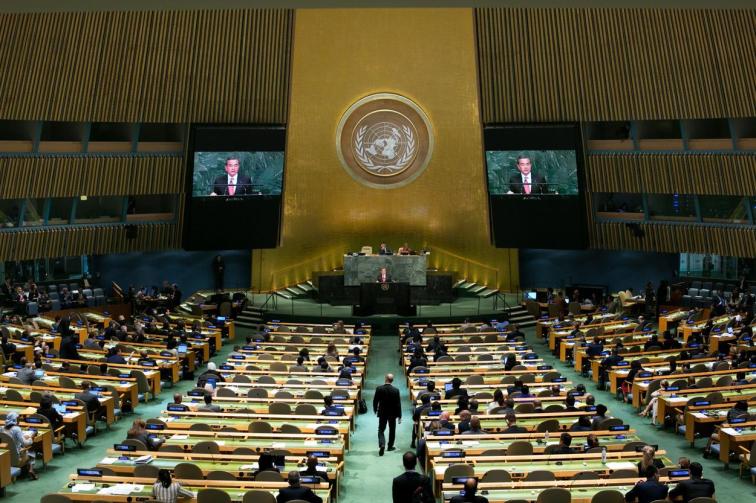File Photo: An employee at an Industrial and Commercial Bank of China branch in Huaibei, Anhui Province, processes cash on March 14, 2011. (Photo by VCG/Getty Images)
[People News] Some banks in China are requiring customers to provide proof of fund sources issued by local police stations when withdrawing money, triggering widespread public criticism. Banks claim that the measure aims to strengthen anti-fraud efforts and ensure customer fund safety. However, customers widely view these measures as overly cumbersome and potentially infringing on their legitimate right to withdraw funds.
According to a report by Radio Free Asia, a recent incident in Dongguan, Guangdong, involving a dispute between a bank and a customer over proof of fund sources has gone viral online. The video shows an older man attempting to withdraw funds at a bank but being asked by staff to provide proof of the source of the funds. This demand prompted the man to confront the staff:
"I’m asking you, whose money is in this account? Why can’t I decide what to do with my own money? This money was transferred from my son in Shanghai. Can’t I transfer it back now? Why can’t I send my money back? Should I call the police or the investigative team?"
Eyewitnesses reported that the man originally intended to withdraw a certain amount of money, but the bank staff informed him he needed to provide proof of the funds’ source. The man became visibly upset and questioned the staff on the spot. The staff explained that they were following relevant regulations intended to prevent telecom fraud and other illegal activities.
In response, online commentators argued: "Banks shouldn’t ask customers to prove the source of their money; instead, banks should verify whether the money is legitimate."
Bank Customers Face Restrictions on Online Transfers
Mr. Xu, a resident of Jiangsu, shared in an interview with Radio Free Asia on Tuesday (Dec. 3) that his child needed to pay tuition fees, but the bank imposed a daily transfer limit of 5,000 yuan via mobile banking:
"My child’s tuition is over 7,000 yuan, but I couldn’t transfer the full amount—only up to 5,000 yuan. Even through mobile banking, not withdrawing cash, I had to split the 7,000 into a 3,900-yuan transfer and another 2,900-yuan transfer. But I couldn’t complete both in one day. It wasn’t two transactions; it’s a hard limit of 5,000 yuan per day."
In response, the bank stated it would enhance employee training and management to improve service quality and ensure such incidents do not recur.
On Sunday, Southern Metropolis Daily published an editorial titled Anti-Fraud Measures Must Not Arbitrarily Restrict Personal Bank Accounts. The article discussed recent cases where anti-fraud measures imposed by banks restricted customers’ ability to manage their funds. It argued that the legal right of depositors to freely use their funds is protected, and banks cannot arbitrarily restrict normal account operations under the guise of anti-fraud efforts. The editorial emphasized that while banks play a role in assisting with fraud prevention, they should optimize their systems and processes to avoid unnecessary harm to ordinary customers.
Rising Thresholds for Bank Withdrawals
A few years ago, the People’s Bank of China issued a directive requiring customers to make appointments for withdrawals exceeding 50,000 yuan. Banks stated that depositors could withdraw their money during their appointed times after providing personal information. However, media reports indicate that this threshold has been lowered in some cases.
In June, a bank in Jilin Province reportedly required customers to provide proof from their local police station for withdrawals exceeding 20,000 yuan. Following this, incidents were reported in other cities: A man in Qingdao was unable to withdraw funds after bank staff demanded proof of the source of his money. A woman in Shenyang attempting to withdraw 5,000 yuan was required to bring her husband to the bank. Another woman in Xingtai faced lengthy questioning from bank staff when trying to withdraw money to pay for her husband’s medical bills.
Mr. Chen, another Jiangsu resident, speculated that the restrictions on withdrawals reflect a shortage of cash at banks. He said: "Previously, the limit was 50,000 yuan. Now it seems to have been lowered. I suspect the banks don’t have much cash on hand. The economy is in a slump. Supermarkets and large stores see almost no customers—there are more staff than shoppers. At large supermarkets, you used to have to queue to pay. Now you can check out directly at the counter without waiting."
Mr. Chen added that as incomes decline, most families are cutting back significantly on spending:
"People’s incomes are low now. When they have a little money, they save it. Some go to the bank to withdraw money for daily expenses. But you always need to spend money to get by."
Public Reaction to Bank Measures Intensifies
The public has reacted strongly to the new measures imposed by banks, with many questioning their legality and necessity. One netizen commented: "Depositing money is simple, but withdrawing it requires layers of approval. Does this not violate the principle of 'voluntary deposits and free withdrawals' stated in the Commercial Bank Law of the People’s Republic of China?" Others criticized the measures as improper tactics by banks to reduce cash outflows.











News magazine bootstrap themes!
I like this themes, fast loading and look profesional
Thank you Carlos!
You're welcome!
Please support me with give positive rating!
Yes Sure!